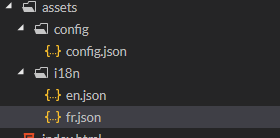I'm building an application using the latest Angular5 and what I need is for a user to be able to switch languages. I've never had to implement this in an Angular2+ (actually I'm using Angular5).
I need to set translations in two places:
- Component's template html - change labels to the specified language
- In code in the component.ts file - I may need to translate some strings that are built dynamically under particular conditions in the code
I was looking at ngx-translation and it looks to do everything I need, as in it allows you to change language without rebuilding your code, see here. However I read it was probably going to be deprecated due to the main developer moving to the angular team to develop their i18n code.
I also understand that the current i18n doesn't support everything I need right now, see here.
My question - what is the state of play for translations in the latest version of Angular? Are there other libraries people would recommend instead, if indeed, Angular itself hasn't got full support as of yet (for changing language without recompiling)? Is ngx-translate good for the future?
Any guidance in this area is greatly appreciated!


